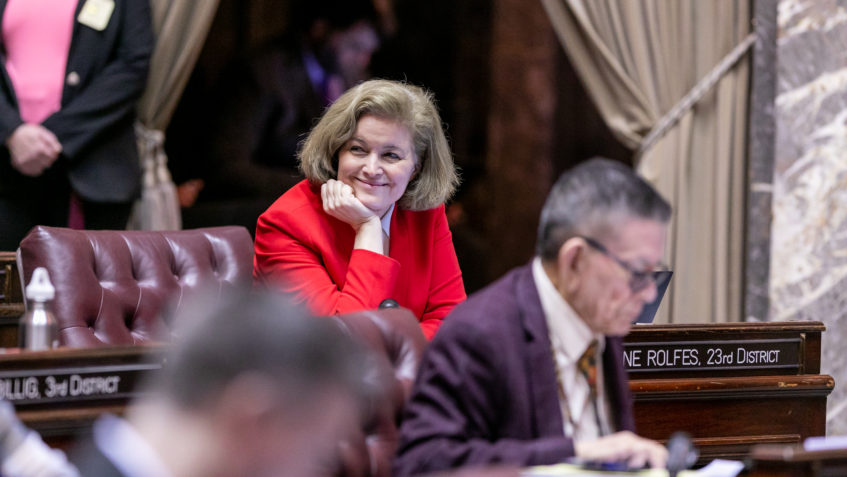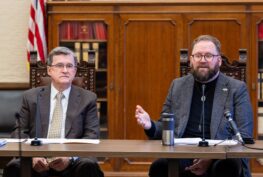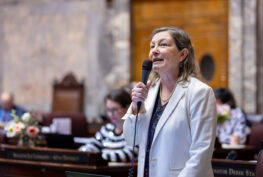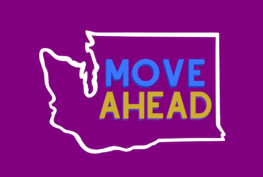OLYMPIA – Budget leaders in the Washington State Senate today unveiled a $63.4 billion supplemental operating budget plan that increases investments to support working families and public schools, reduce poverty and homelessness, and address the climate crisis.
The budget adds roughly $5.8 billion in new spending to the two-year budget passed by lawmakers last April, including a $2B transfer to help fund the Move Ahead Washington transportation package.
“After two difficult and challenging years, Washingtonians are ready to look to the future with hope, and this budget provides an optimistic vision for our state,” said Sen. Christine Rolfes, (D-Bainbridge Island), chair of the Senate Ways & Means Committee. “This budget delivers for working families, our schools, the environment and takes bold steps to reduce poverty and homelessness.”
Combined with investments from the proposed capital budget, more than $600 million will target the immediate shelter needs of the state’s homeless population and support new affordable housing programs. Another $600 million will support K-12 schools, including new funding for additional counselors and nurses.
Salmon habitat protection and conservation efforts would receive more than $400 million under the proposed plan, which includes nearly $200 million in tax incentives to encourage solar energy projects and speed up the transition to electric vehicles.
Several provider rate increases are proposed, including funding to improve access to medical and dental providers and help connect people in need of mental health treatment to services in the community. A new investment of $125 million will fund reinvestment grants to communities affected by the nation’s war on drugs, which disproportionally harmed Black, Brown, and Indigenous communities.
Several targeted tax incentives are proposed to support small businesses, health clinics and efforts to entice more film production in the state.
The budget plan includes no new general taxes and complies with the state’s four-year balanced budget requirement. It leaves $3.3 billion in total reserves at the end of the biennium. Over the four-year outlook, the reserves are expected to grow to $4.6 billion.
The budget will receive a hearing today at 4 p.m. in the Senate Ways & Means Committee.
Click here to view more highlights of the plan and click here to view find official budget documents and summaries.
Highlights of the 2022 Supplemental Budget Proposal
- $345 million to stabilize school districts that experienced enrollment declines
- $232 million for wage increases and other compensation changes for state employees
- $209 million for various salmon recovery projects across the state, including the Duckabush estuary restoration project
- $208 million to increase rates for vendors providing services to individuals with a developmental disability or with long-term care needs
- $199 million in total funds to extend the Medicaid transformation project for five years
- $172 million to address the physical and social emotional needs of students
- $125 million for reinvestment grants to communities disproportionately impacted by criminal laws and penalties for illegal drug sales, possession, and use
- $100 million to address workforce shortages and other challenges in behavioral health
- $95 million to increase rates for Working Connections Child Care, Behavioral Rehabilitation Services, Child Visitation, and Combined In-Home Services
- $93 million for costs associated with resentencing, as required under State v. Blake
- $75 million for the Farmers-to-Families Food Box Program
- $58 million for clients living in a shared living situation under the Liang settlement
- $41 million to transition encamped individuals from rights-of-way to permanent housing
- $38 million for expansions within the Aged, Blind, or Disabled program
- $29 million in total funds for projects within the Information Technology pool
- $29 million for nursing education and support within higher education
- $18 million for cybersecurity training programs within higher education
- $18 million for a benefit increase for eligible retirees of TRS1 and PERS1
- $17 million for investments in the Early Childhood Education & Assistance Program
Other budget items of note include:
- $2 billion to support the transportation budget (Multimodal Account)
- $1.5 billion for emergency response (Washington Rescue Plan Transition Account)
- $500 million for IT projects (Strategic Enterprise Reserve Planning Technology Account)
- $400 million for seismic upgrades (School Seismic Safety Grant Account)
- $350 million for paid family leave (Paid Family Medical Leave Insurance Account)
- $217 million for legal expenses (Self-Insurance Liability Account)
- $100 million for salmon recovery efforts (Salmon Recovery Account)
- $30 million for cancer research (Andy Hill Cancer Research Endowment Account)
About the Supplemental Budget
Supplemental budgets are passed in even-numbered years and allow the state to make mid-course corrections to the two-year budgets passed in odd-numbered years. It gives the state the opportunity to adjust spending to keep families safe, provide high-quality education, and address other emergent needs like public health.





